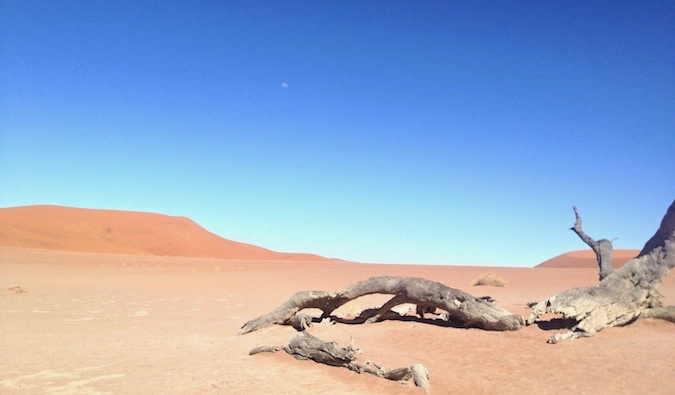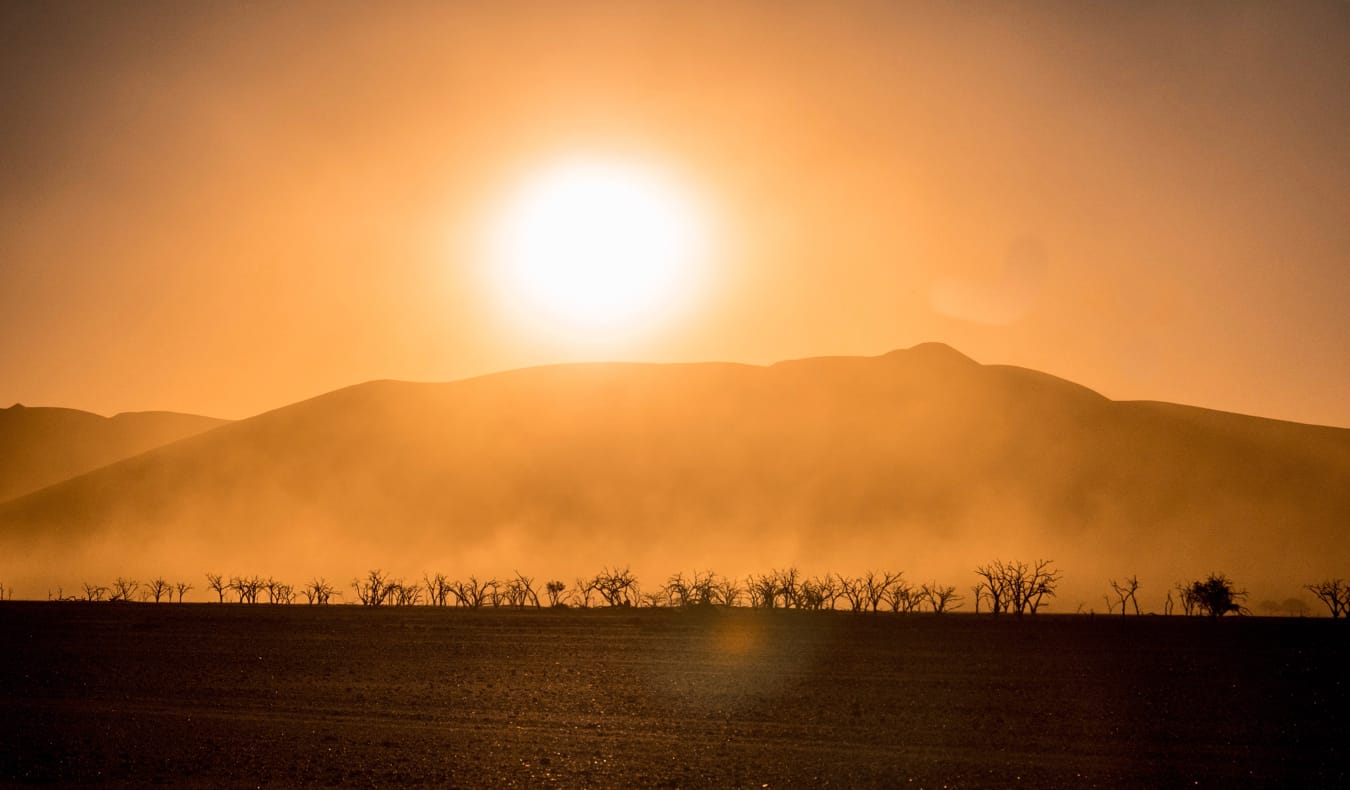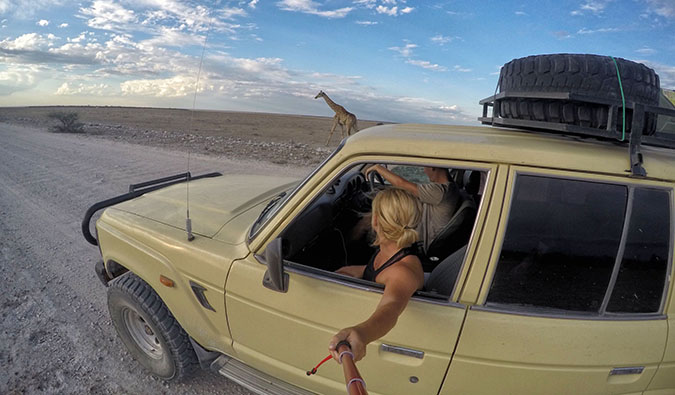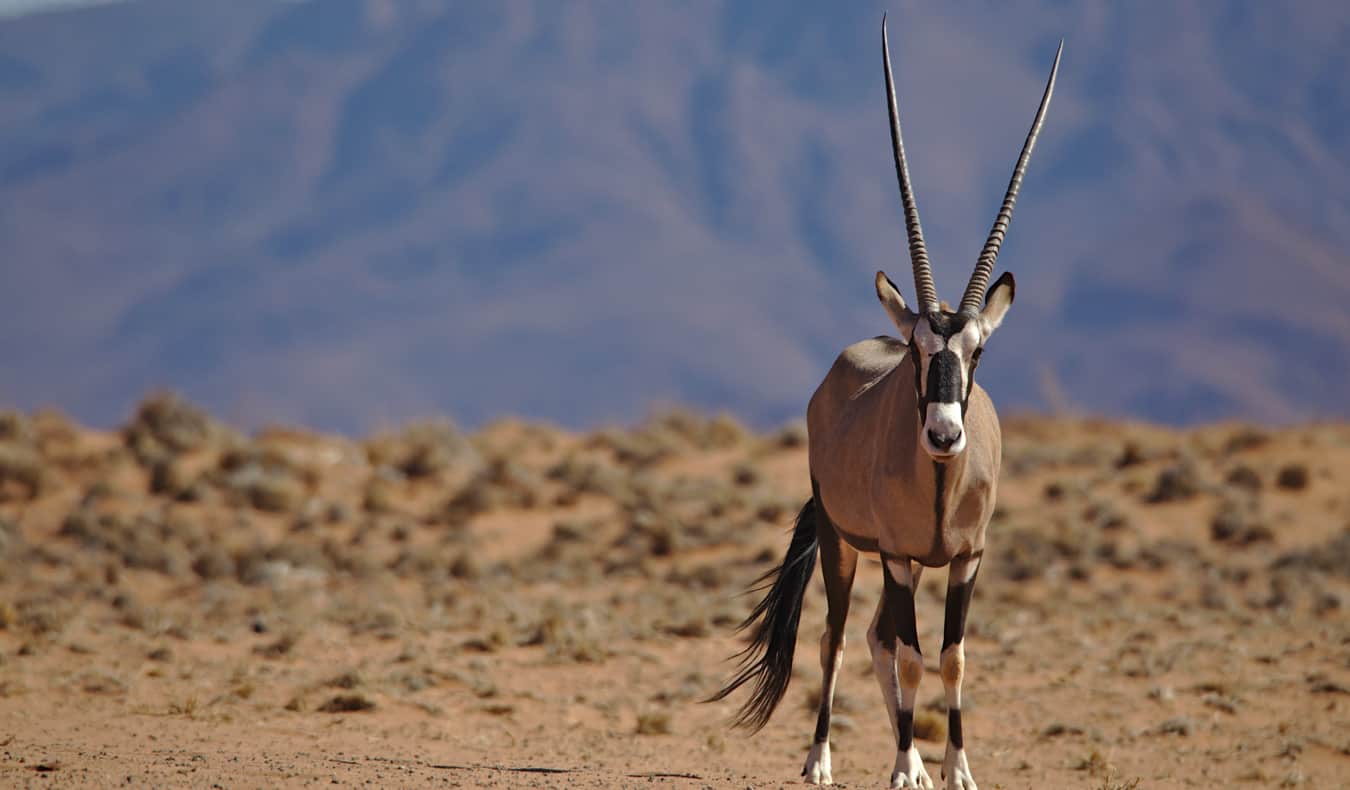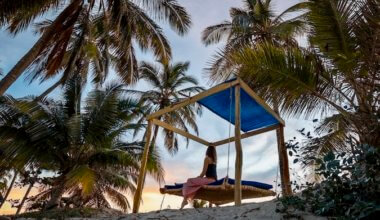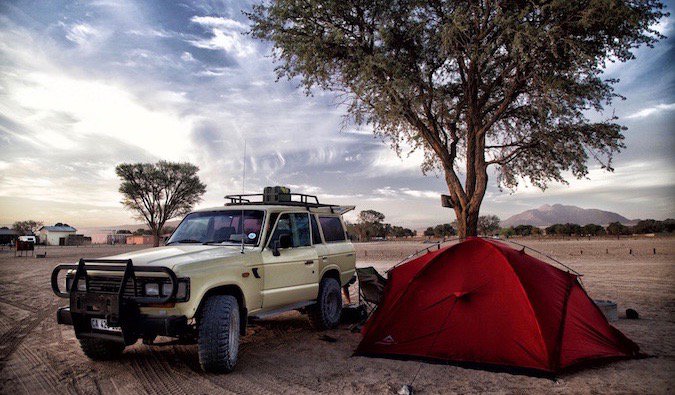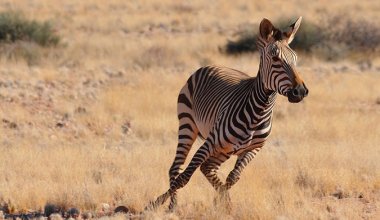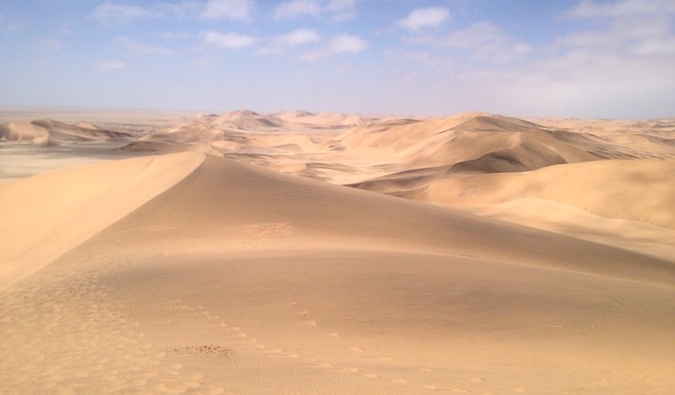
Last Updated: 11/12/20 | November 12th, 2020
Welcome to the latest post in our Africa column by Natasha and Cameron from The World Pursuit. While I’ve been to the continent in the past, I’ve only seen a few countries so I’m super duper excited to have these two travelers share their knowledge about traveling the continent. This month they are sharing how to travel around Namibia (one of my favorite countries in the world) on a budget!
As steam rose from the tarmac and mirages presented themselves in the far distance, our truck’s engine nearly boiled over. We drove through empty Namib Desert in 40°C (104°F) heat with the windows down and heat on full blast to cool it off. Traveling around a sparsely populated desert country in Africa presents its challenges!
Despite our desert adventures, we loved traveling around Namibia and think it’s a great African destination to explore, especially for first-time travelers to the continent. We saw the sun rise over the largest sand dunes in the world in Sossusvlei and listened to thousands of seals give birth at the Cape Cross Seal Colony. Just driving around the country without seeing a single other person for hours made us feel as if we were on another planet.
Namibia is a special place that many in the world have never even heard of. Compared to South Africa, it’s a lot less visited by tourists, especially those traveling on their own and not on a tour. But we found the country easy to visit and affordable.
Where Did We Go?
We entered southern Namibia, as we were traveling north from Cape Town, and exited via the Caprivi Strip into Botswana. Here is the route we followed.
Fish River Canyon – Luderitz – Aus – Kalahari – Namibrand Nature Reserve – Sossusvlei – Walvis Bay – Swakopmund – Skeleton Coast – Spitzkoppe – Etosha National Park – Caprivi Strip
This route took us a month to complete, with most stops taking up 3-4 days of our time. We wanted a relaxing holiday, but if you move fast and are short on time, you can easily do a Namibian road trip like this in 15-20 days.
We decided to skip Windhoek, as there wasn’t much in the capital city we were dying to see. Due to lack of time, we also skipped the northwestern Kunene region, which is where the Himba people live. For those wanting to travel to this part of the country, the only way to get there is with a fully equipped vehicle or a tour. The region is isolated, so you must be fully capable of getting yourself out of any circumstances and stock up with food and water.
How Much Does It Cost to Travel Around Namibia?
Namibia is one of the cheapest countries in Africa. It uses the Namibian dollar (NAD), which is around 1:1 with the South African rand, and all prices are about on par with South Africa. Depending on your chosen method of transport and accommodation preference, Namibia can easily be done on a budget.
We averaged about $45 USD (600 NAD) a day per person for campsites, food, beer, and transportation, with a majority of that going to fuel (our Land Cruiser was thirsty – 6km per liter/14 miles per gallon – and distances are long).
Here are some average prices from our trip:
- Campsite – $6 USD (80 NAD) per person per night
- Dorm bed – $8 USD (100 NAD) per person per night
- Private double room – $45-$60 USD (600-750 NAD) per night
- National park fees – $6 USD (80 NAD)
- Petrol – $0.80 USD (10 NAD) per liter
- A cook-your-own-pasta meal from the supermarket – $2.50 USD (30 NAD)
- Salad from a café – $4 USD (55 NAD)
- Bottle of Windhoek beer – $1.10 USD (15 NAD)
- Cup of coffee – $2 USD (25 NAD)
So if you were staying in dorm beds, taking the train, and cooking all your own meals, you could get by on a budget of $20-30 USD a day. However, if you want to camp and get outside the main cities, you will need to take a tour or have your own vehicle, which will up your costs to about $45 USD (to self-drive with four passengers) to $90 USD (for a tour) a day.
How to Get Around Namibia
Bus
There is no official public bus system in Namibia, but there are local buses that connect almost all of the major towns and cities.
The most reliable bus option in Namibia is the Intercape bus service. They are generally in good condition and safe, and even provide air conditioning. Intercape buses do not run every day and don’t have many stops, so it’s important to look at the website for their routes and schedule.
Prices vary according to the distance traveled: a bus from Windhoek to Livingstone, Zambia, costs roughly $55 USD depending on the exchange rate, while a bus to Springbok, South Africa, from Windhoek costs $65-85 USD.
Rental Car
This is the most popular form of traveling in Namibia. The rental truck industry in Windhoek, the capital, is booming! With wide-open desert roads, towering sand dunes, and no one around, a road trip in Namibia is the perfect way to go exploring.
Rates for a rental truck stocked with everything you need for camping and a pop-up tent vary depending on the season. In low season (January–July), you can pick up a two-person Hilux for $85 USD a day; in the high season (July–December), it will go for around $130 USD a day. The more bells and whistles you add on to your rental, the higher the cost gets. When we last visited in November, the entire country was sold out of rental trucks in what was traditionally the shoulder season, so it is highly advised to book in advance.
Overland Tour
We talked about overland tours previously. There is a really wide range of ways in which you can do a tour in Namibia. The least expensive option is to go with one of the many overland tour companies such as Oasis, Nomad, Acacia, or Intrepid.
Tours are great for solo travelers looking to meet people, and also for those that want maximum fun with minimal planning effort. Overland tours in Namibia start at an average of $125 USD per person per day. These tours cover all transport within Namibia, activities, camping, and most meals.
Train
The TransNamib passenger train makes only a few stops, but it definitely provides interesting views of this desert country out the window. Trains mostly operate at night, so if you plan to make use of the train you should be prepared to sleep in a first-class seat or economy reclining seat. There are no sleeping cabins aside from the Keetmanshoop-Windhoek train. Tickets range from $6-$15 USD.
The Desert Express is a weekly train geared toward more luxury-minded tourists, with prices starting at $295 USD per ticket.
Hitchhiking
There seems to be an increasing number of vagabonds in Africa who are getting themselves into dangerous situations and relying on strangers to bail them out. We would not recommend hitchhiking in Namibia, as the population is sparse and it could be hours between passing cars.
Tips for Traveling in Namibia
Traveling around Namibia is fairly straightforward. Here are ten tips to keep in mind for your trip there.
- Learn how to change a tire – Namibian roads are very rough on cars. They are badly corrugated and dry and dusty. Make sure you know how to change a tire in case you get a flat or else you could be waiting on the road for a few hours.
- Avoid night driving – Whether self-driving, on an overland tour, or taking buses, we would advise against any kind of night driving. There are no streetlights on Namibian roads, and cattle roam freely on them.
- Don’t rely on the internet – We found the Wi-Fi in Namibia to be passable at best, and even if you pick up a SIM card, don’t expect it to work anywhere but in the cities and towns. Much of the country is empty desert where there are no cell phone towers.
- Stay full and hydrated – No matter what kind of transport you use, it’s important to stock up on food and water. Western-style supermarkets can be found in Windhoek, Swakopmund, Walvis Bay, Luderitz, and other relatively large towns.
- ATMs can only be found in main cities and towns – You will be able to withdraw cash in Windhoek, Swakopmund, Walvis Bay, and Luderitz, but we would be wary about being able to in other places. Make sure to have enough cash on you to make it to your next major destination, as credit cards aren’t widely accepted. Almost all places in Namibia accept South African rand as well.
- Prebook in the high season – Namibia’s high season runs from mid-May to mid-November, so we would recommend booking your accommodation for these months ahead of time. Even the campsites book up with overlanders. We visited in November and ran into problems a few times with hotels being at capacity.
- Stay safe – Namibia is one of the safest countries in Africa. However, it is still a developing nation, and common sense should be utilized, especially in the capital of Windhoek, which in recent years has seen a rise in crime. Don’t show signs of wealth, use vigilance at night, and all should be OK.
- Namibian national parks are affordable – We found that Namibia has some of the cheapest national parks in Africa. Etosha National Park, for example, is the largest and easily most recognized park in the country, with entrance fees costing as little as 80 NAD ($6 USD)! The wildlife spottings are fantastic in the dry season as well.
- Take care of your electronics – The desert heat is no joke, and neither is the sand. Cameras, laptops, and even cellphones should be well protected from the dry air and dust that can easily find its way into the tiny crevices of your valuables.
When people ask us what country they should visit in Africa, Namibia is always at the top of our list. There is just something about seeing the stars twinkle in the desert night without a soul around.
Even though we had a month in the country, we still felt we could have delved way deeper into the remote parts and explored more. The country is vast and has so many interesting things to offer, we can’t wait to return!
Natasha and Cameron run the blog The World Pursuit, focusing on adventure and cultural travel. The two of them met in the film industry before they decided to abandon the American lifestyle and travel the world together. They recently bought a 4×4 at the tip of Africa and are traversing the continent while documenting their story on Instagram and Facebook.
Book Your Trip to Namibia: Logistical Tips and Tricks
Book Your Flight
Use Skyscanner or Momondo to find a cheap flight. They are my two favorite search engines because they search websites and airlines around the globe so you always know no stone is left unturned. Start with Skyscanner first though because they have the biggest reach!
Book Your Accommodation
You can book your hostel with Hostelworld as they have the biggest inventory and best deals. If you want to stay somewhere other than a hostel, use Booking.com as they consistently return the cheapest rates for guesthouses and cheap hotels.
Don’t Forget Travel Insurance
Travel insurance will protect you against illness, injury, theft, and cancellations. It’s comprehensive protection in case anything goes wrong. I never go on a trip without it as I’ve had to use it many times in the past. My favorite companies that offer the best service and value are:
- Safety Wing (for everyone below 70)
- Insure My Trip (for those over 70)
- Medjet (for additional repatriation coverage)
Looking for the Best Companies to Save Money With?
Check out my resource page for the best companies to use when you travel. I list all the ones I use to save money when I’m on the road. They will save you money when you travel too.
